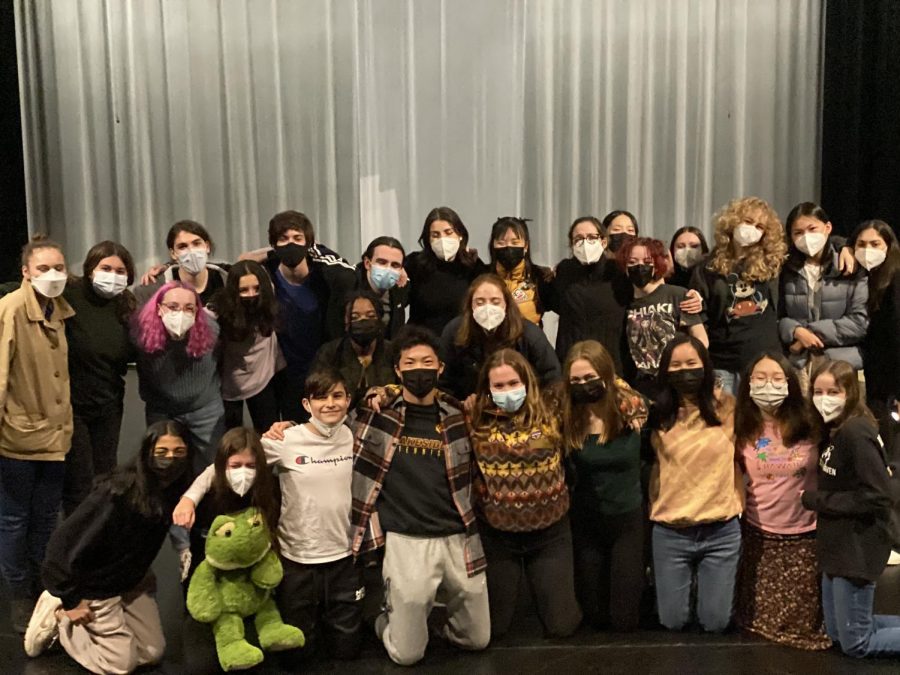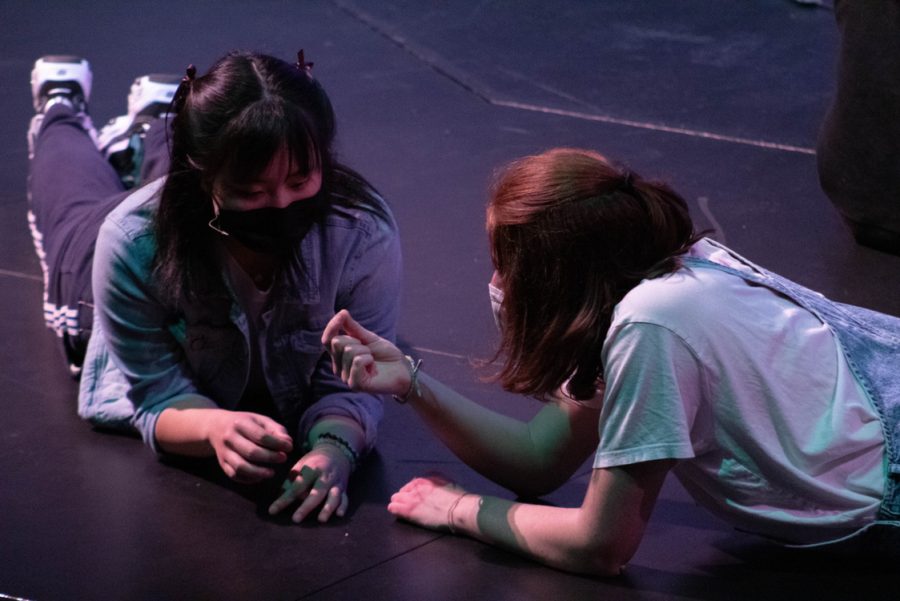Fall Play 2021 Reflections: It’s More Than Teenage Angst
On the evening of October 30th, after closing night and an hour-long feelings circle that bubbled with laughter, gratitude, and, well, feels, the 2021 Lakeside Fall Play drew to an official end. Walking across Red Square at 10:30 p.m. with bundled flowers, lingering makeup, and the thought that “wow, this really is the end” felt infinite but nostalgic already.
After more than a year of remote productions, the cast of fall play — The IT by Vivienne Franzman — had three successful live performances, a rewarding finish to two months of hard work. Although we “had some challenges,” as director Alban Dennis would say, rehearsing and performing in-person was a gratifying experience. This was the most normalcy many of us had experienced in a long time, from four-to-nine nightly rehearsals to takeout Mexican food that tended to explode in the car. The play is also quite funny at times, filled with Ed Sheeran songs, endangered vaquitas, and Anna Beauty’s handbags (#clutch #retrovibes #bringonthesummer). The Lakeside theater community was thrilled to be back together. By the end, we have made so many meaningful connections that it’s hard to imagine how many of us had never met before that first rehearsal.
The IT was a poignant choice for our first on-stage production since March 2020. Though easily mistaken for an uncanny sci-fi horror story, the play was ultimately molded into a striking work of art that showed surprising capacity for resonance, discussion, and healing. The artistic team and theater production class did a terrific job crafting the stage designs. The set-up was minimalist, consisting of three thin, white sheets on stage left, center, and right. “There were so many creative uses of lights, props, and other media such as projectors, music, and other decorations,” writes Yoon L. ’23, “There were times, particularly at the climax, where The IT took on a modern performing art quality that had me enraptured. I loved the use of thin sheets to represent Grace’s anxiety bubbling up beneath her skin, perfectly mirroring the psychedelic narration that preceded and accompanied this part.” The cast and director also worked well together to tell a coherent and vibrant story. Beyond your typical teenage angst, the play embedded more serious and pertinent discussions of anxiety, depression, parental pressure, and more.
Our personal experiences with the production were positive. Although performing live with masks was challenging, we turned it into an artistic choice that strengthened the relevance of the play — by setting it in 2021. Having a live audience for the first time in over a year was incredible, as we were able to interact with them. Reactions from the audience increased confidence and energy levels, and performances were progressively better each night. It was a sometimes surreal experience, as we transcended beyond just students acting on stage and instead became immersed in telling the narrative.
What brings it all together are the feelings of isolation that Grace Freemantle, the main character, experiences. Told by Grace and other students in an episodic, interview-like format, the play recounts how the “IT” — a supernatural entity that Grace feels festering inside her — grow and worsen more and more as Grace repeatedly suppresses her feelings of anxiety, stress, and loneliness, which ultimately led to “that day in PE” where Grace experiences an emotional explosion and roars. In addition, each student in the play finds a certain degree of resonance with Grace’s struggles in their own experiences. We see close relatability between the play and what all of us have been grappling with over the past year and a half: how the physical isolation of quarantine often led to emotional and social isolation as general mental health deterioration. The IT physicalized this pain of separation.
Although we faced minor technical difficulties — not uncommon for high school productions — the play ran relatively smoothly. Interestingly, the performance evoked a wide range of responses from the audience. We gained insight into viewers’ perspectives through interviews and anonymous responses from the Tatler Poll.
Feedback concerning the acting and stage design were generally positive, though there were mixed thoughts regarding the play itself. Some students appreciated the messages of the play, but there was also confusion and criticism regarding the writing and plot. One sophomore wrote, “I see the reason behind choosing this specific play, [but] there have got to be better plays about mental health. The metaphor in the play was off putting and hard to understand.” Another student felt that when the play “was told by other students telling stories about Grace, [it seems like] Grace being odd and ultimately aggressive was the truth. This made us…feel uncomfortable, isolated, and called out in a negative way.”
These are fair remarks. Knowing that the metaphor of the IT is very abstract, the cast clarified the meaning of the IT in the post-show Q&A. The IT does not represent people with mental illness nor their struggles; instead, the IT is what happens when a person is unable to share their feelings and consequently suppresses them.
However, this metaphor sometimes dangerously approached the misconception that people who experience mental health problems border on crazy and must act erratically. According to one student, “it portrayed mental health as either ’you’re crazy’ or ‘you’re normal,’ and as a person with moderate OCD that isn’t always visible at first sight, this seemed like an unhelpful division.” In the Q&A, the cast acknowledged that the play only portrayed a single fictional person’s experience and is not meant to be a universal representation of mental illness. People with the same anxiety and depression that Grace struggled with can have very different experiences than her, and they may find themselves feeling and expressing emotions in different ways. The cast also explained the ending, where Grace returns to stage and offers a hand to a student who is also struggling with mental illness. We hoped to show that Grace is able to heal from mental illness and is now capable of being there for someone else. For live-stream viewers, the Q&A was not shown due to privacy policies, so these follow-up discussions were not made available to them.
Some responses from the poll also felt like the play was mostly meant for parents. One student wrote, “It seemed almost catered toward older audiences and what they WANT to hear rather than what teens today NEED to hear.” Some students wanted the play to provide ways to reach out to adults and friends and provide coping mechanisms instead of just showing a scenario where everything went wrong.
This may be true to a certain extent, but we also saw value in parents gaining more insight and understanding of family dynamics and teenager’s struggles with stress and mental illness. Rui Zhang, parent of Shuai Shuai L. ’23, found the performance incredibly provocative. “I was so deeply affected when Grace stopped expressing herself, became silent, and isolated herself from everyone else. In some moments I felt her pain so tangibly that I just couldn’t stop my tears,” writes Zhang in an email interview. She realizes how parents have the capacity to inflict additional stress and pain upon children, even when the intention was out of love. “‘It’s for your own good’ is not always the right response,” writes Zhang, “We need to learn how to communicate better with them, and to be the ones they can trust and lean to when needed.” Parts of Grace’s pain stem from her inability to communicate with her mother, and many other characters struggle to form relationships with their parents as well. It is heartwarming to see many parents reflect upon this.
Ultimately, the goal of The IT was to encourage dialogue — not only regarding the play but also extending to the experiences of Lakeside students and families. Hopefully, our production will result in more conversations around the topics of teen mental illness, something that is frequently stigmatized by society. Although our production was imperfect, it was an incredibly enriching and meaningful experience for students and adults alike.
Hallie X ‘23 has spent much of her time over the past three years contributing to Tatler’s collection, amassing over 20 articles in total. She covers...
Review: Lucy: The Movie (★★★★☆)
Released in 2006, Lucy was an instant classic the day she hit movie theaters. The movie’s character development...


